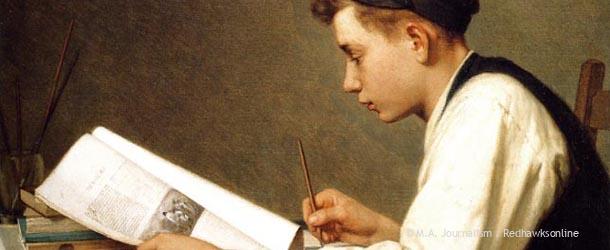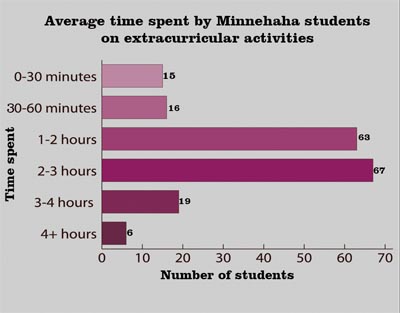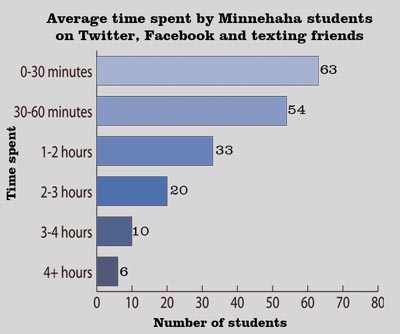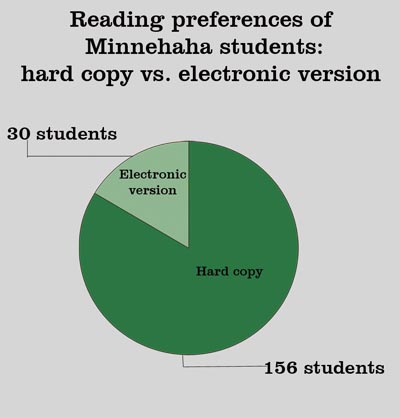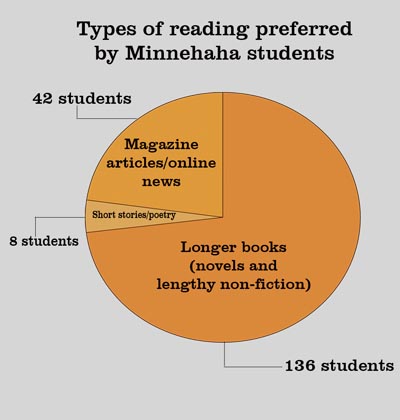Reading: lots of interest, little time
“It’s different than when you’re in the city, when you’re driving around and there are [always] lights overhead,” began senior English teacher Kristofor Sauer. “[But] on car trips, especially out in the middle of nowhere, I would wait and wait and wait for a car to come up behind us. Then the headlights would project on the seat in front of me, and I could hold my book up and read even when it was dark out.”
What happened to this voracity among teenage readers? Parents and teachers always nag high schoolers to read instead of going online, but according to a survey offered to all Minnehaha students, students claim that they don’t have enough time for leisure reading with homework and extracurriculars. The survey showed students spend an average of two hours on homework, an hour on Facebook, Twitter, or texting per day, and two hours on extracurriculars. The survey reported that 30 percent of males said they enjoy reading, but don’t do it unless it’s required; 20 percent said they enjoy reading, and read as much as they’d like to; 50 percent said they enjoy reading, but don’t read as much as they like to. the breakdown for females in these same categories were 18 percent, 19 percent and 63 percent, respectively.
Minnehaha Academy is renowned for its arts, athletics and academics because of the impressive achievements resulting from students’ passion to excel. Each year Minnehaha produces high-level productions such as Big River (which won an Outstanding performance award from the Spotlight), the school sends off athletes to state tournaments and recognizes National Merit Scholars.
However, these accomplishments require countless hours of hard work, and students feel they leave little time for anything else.
Sophomore Hazen Mayo, who takes two AP classes, was in the fall musical and is on the alpine ski and lacrosse teams, considers herself an avid reader, but she feels like there isn’t enough time.
“I always get home late after sports or activities, and by that time I have to get my homework done,” said Mayo. “I really enjoy reading though because I honestly find it a fun way to relax.”
Sauer also recognizes that students have a lot on their plates and may not have to time to read for fun.
“I think it’s completely realistic with what’s expected and required of students at Minnehaha,”
said Sauer of students claiming they don’t have time to read for fun. “I know that for you guys it’s enough just to get through what you have to do for school.”
However, this doesn’t mean that there aren’t opportunities for students to read outside of their assigned material. Sauer says that he is extremely busy, but still tries to find time to read.
“I find myself swamped, almost as a matter of course,” said Sauer. “It’s like a constant state. School starts, and I don’t have time [to read for fun]. But I try to make it a goal to actually read a few novels every Christmas and summer.”
Reading may be a possibility during the regular school year if time online was reduced and was replaced by reading as a relaxation method.
“I love reading,” said freshman Blythe Colvin, “but I get distracted in the whirlwind of school and music lessons. I play a lot of instruments and also like to have lots of downtime on the computer.”
Junior Scott Crawford also enjoys reading but feels like he doesn’t have enough time to read for fun, though he has found another way to get his “book fix.”
“I don’t have time to read just for fun, but I have [books] on my iPad and listen to [them] audibly, so whenever I’m doing homework I listen to it.”
Crawford enjoys reading for more than just entertainment.
“It’s like brain exercise,” said Crawford. “I enjoy it [and] get lost in the characters.”
A majority of students reported interest in reading in the survey, but perhaps don’t realize the benefits of reading outside of school as opposed to spending their time on the internet. The benefits of using this time to read are immense; teens can gain perspective, knowledge and entertainment by budgeting their time more wisely.
English teacher KK Myers encourages students to read because it can open them up to different worlds.
“Imagine that we are in these four walls, but we are able to transport time and space,” said Myers. “What a cool way to think of reading.”
Another benefit of reading is its direct correlation with writing skills.
“When you immerse yourself in anything it is impossible not to be impacted by that which is around you,” said Sauer. “When you start to read a lot your writing starts to take on many of the same characteristics of whatever it is that you’re reading. For the individual who immerses themself in quality literature, it’s the natural byproduct that they are going to become more expressive, more sophisticated, and for lack of a better word, smarter.”
Some teenagers use the excuse “I just don’t like reading” to explain why they don’t do it in their free time, but maybe they aren’t sure what types of books they like. Students who reported that they don’t enjoy reading elaborated saying “It’s boring unless it’s a good topic” and “I don’t like reading unless it’s a really interesting book… then I could sit and read for hours.”
“Often there’s a point where somebody decides ‘I can’t do this,’ so there’s a difference to me between having had that opportunity to love reading versus not being good at it,” said Myers. “What do they like to read? Let’s find that book, then that series or author.”
Whether teenagers choose to read in their spare time or not, there is no doubt that it can be beneficial as a source of entertainment, knowledge and relaxation. Reading for fun doesn’t have to mean reading classic British literature, but reading anything of interest.
“I’m reading this book right now from our local library at Minnehaha,” said Sauer. “It’s a fascinating series of dissertations analyzing the philosophy of The Simpsons. It’s fantastic and I love it.”

